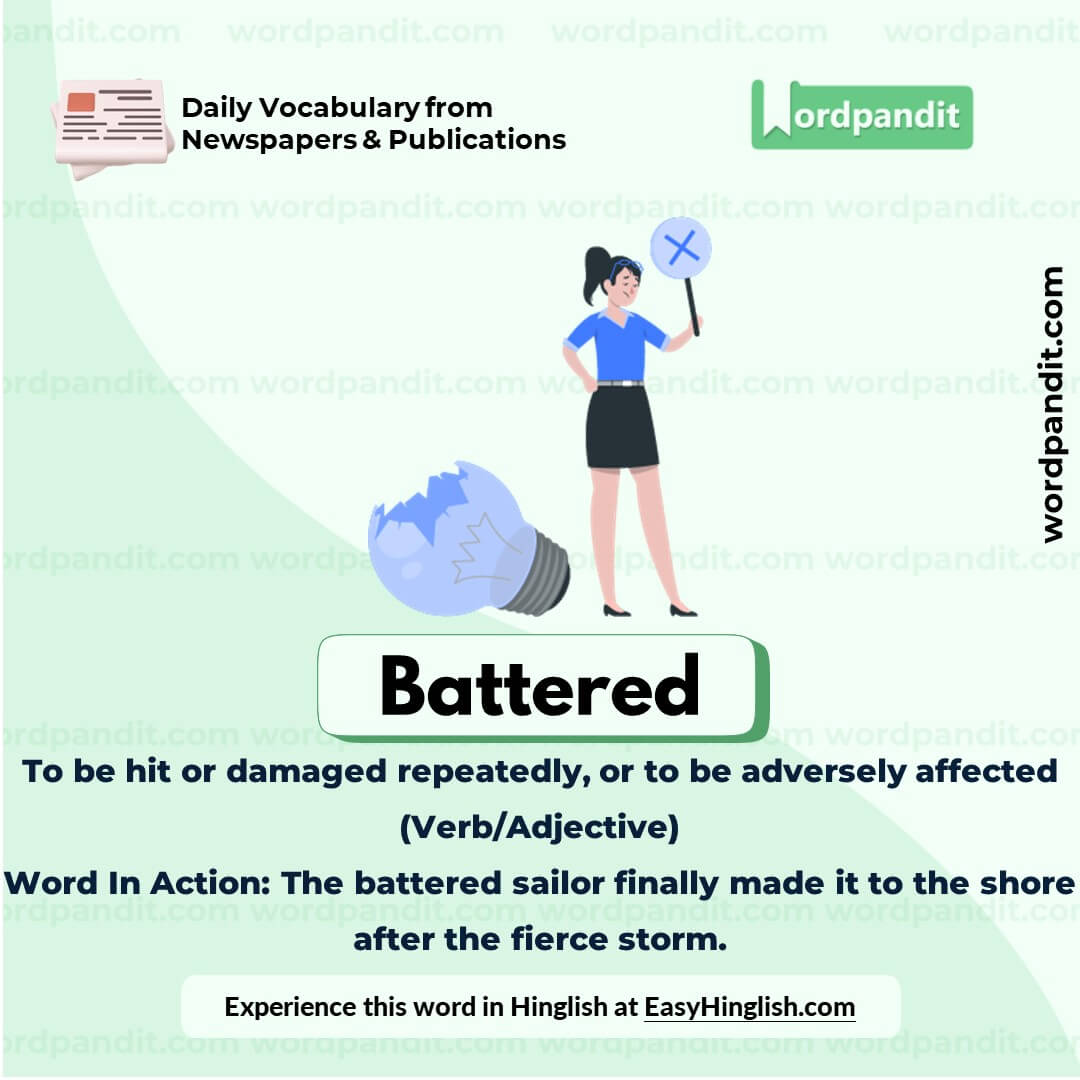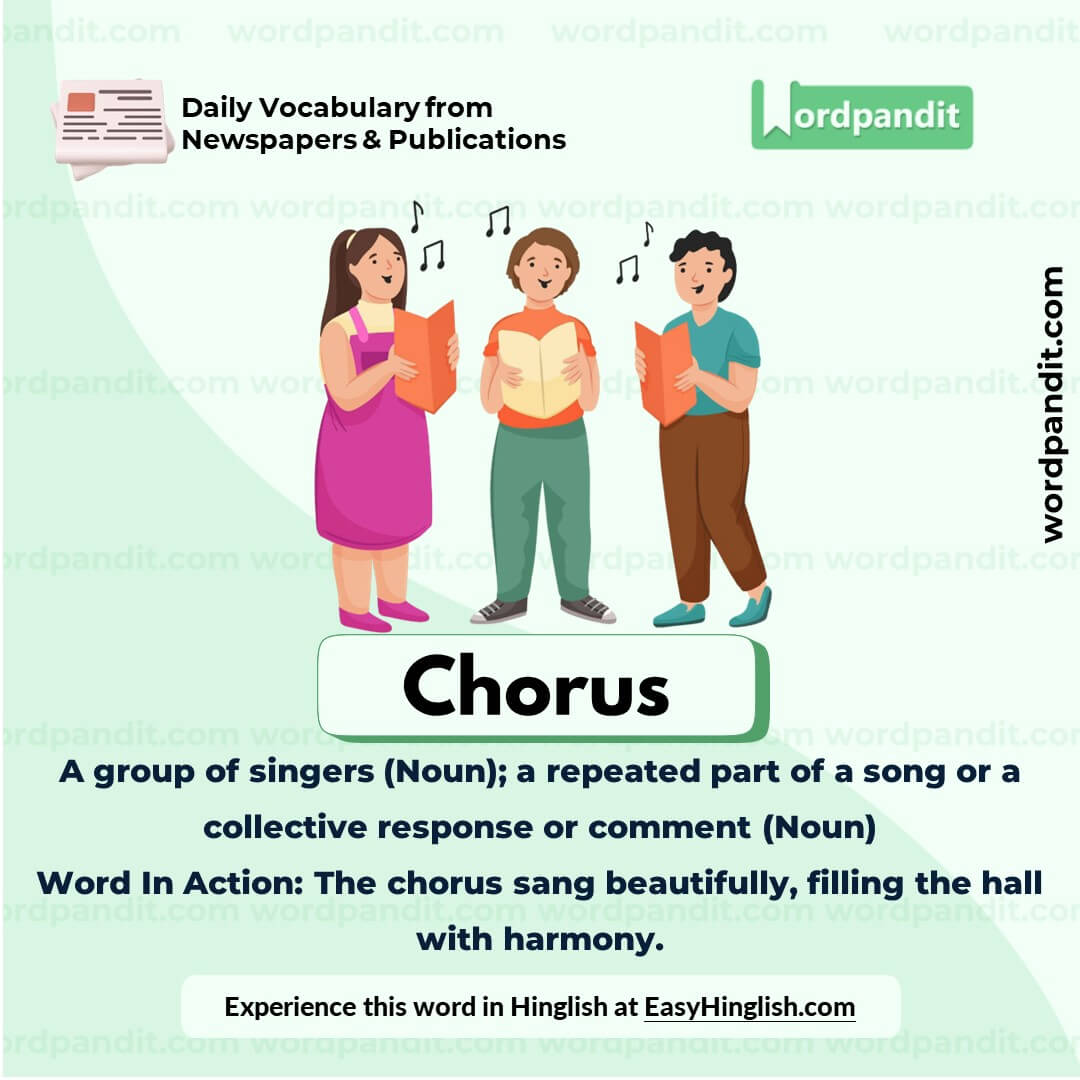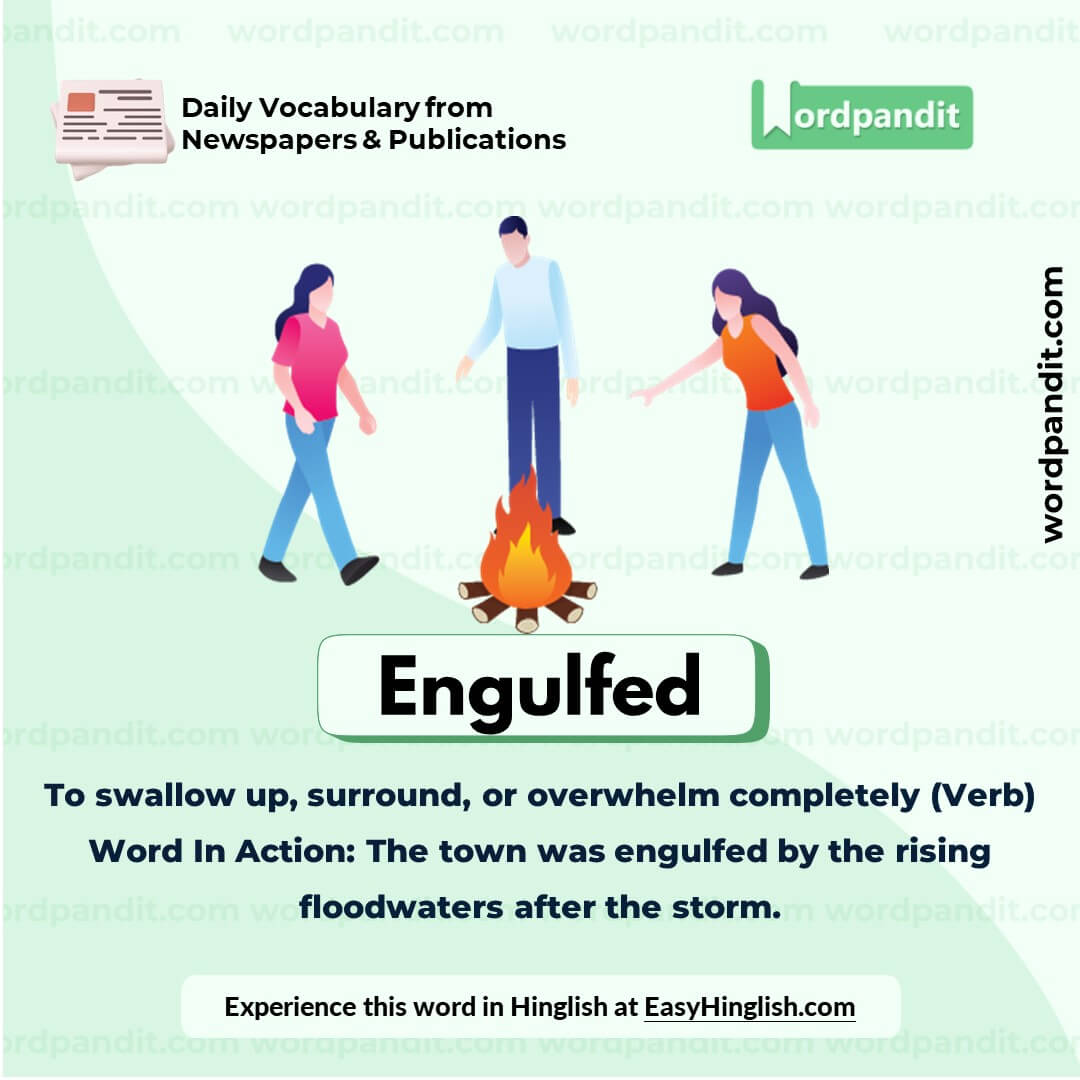Daily Vocabulary from Indian Newspapers and Publications
Welcome to Wordpandit’s Indian Vocabulary Hub
At Wordpandit, we understand the importance of staying rooted in the local context while expanding your language skills. This section focuses on enriching your vocabulary with words and phrases drawn from India’s leading newspapers and publications, ensuring you're learning vocabulary that is practical, relevant, and uniquely Indian.
Why Indian Sources Matter
We believe that the best way to master any language is by immersing yourself in local content. That’s why we carefully curate vocabulary from top Indian publications, including:
- The Hindu
- The Times of India
- The Economic Times
- Hindustan Times
- Live Mint
- The Indian Express
- And many others...
Stay Updated, Stay Relevant
With daily updates from Indian news sources, you’ll be consistently learning words that reflect the trends and shifts in Indian society and culture. Our focus is to provide vocabulary that enhances your understanding of the language in an Indian context.
How Wordpandit Supports Your Goals
Whether you’re preparing for exams, aiming to improve your professional communication, or simply want to stay connected with the latest Indian vocabulary, Wordpandit is here to guide you every step of the way.
Learn with a Practical Approach
Our interactive learning methodology includes real-world examples, engaging activities, and context-specific usage to ensure that every word becomes part of your active vocabulary.
Dive into Indian Vocabulary Today!
Why Choose Wordpandit?
Practical Learning: Focus on words you'll actually encounter in real-world reading, enhancing your comprehension and communication skills.
Diverse Content: From current affairs to scientific breakthroughs, our varied sources expose you to vocabulary across multiple domains.
Effortless Integration: Make Wordpandit a part of your daily routine. Just a few minutes each day can significantly boost your lexicon over time.
Your Path to Vocabulary Mastery
- Visit our Daily Vocabulary section regularly
- Explore new words and their usage in context
- Practice incorporating these words into your own writing and speech
- Track your progress as your vocabulary expands
Start Your Journey Today
Embark on your vocabulary enhancement journey with Wordpandit. By consistently engaging with our daily posts, you'll build a robust vocabulary that serves you well in academic, professional, and personal contexts.
Remember, a word a day keeps linguistic limitations at bay. Make Wordpandit your daily companion in the quest for vocabulary excellence!
WORD-1: Battered
Context:
"The euro was also battered by a closely watched survey showing contractions in November business activity in the eurozone." - Times of India
Explanatory Paragraph:
The word "battered" describes something that has been repeatedly struck or damaged, either physically or metaphorically. In the given context, it refers to the euro being heavily impacted or weakened by economic conditions, as revealed by the survey.
Meaning: To be hit or damaged repeatedly, or to be adversely affected (Verb/Adjective).
Pronunciation: BAT-urd
Difficulty Level: ⭐⭐ Beginner to Intermediate
Etymology: Derived from Old French "batre," meaning "to beat," and from Latin "battuere," also meaning "to beat or strike."
Synonyms & Antonyms:
Synonyms: Damaged, beaten, pummeled, bruised, weakened
Antonyms: Unharmed, intact, undamaged, strong, fortified
Usage Examples:
- The old house stood battered by years of harsh weather.
- Her confidence was battered after failing the exam twice.
- The company’s reputation was battered due to the recent scandal.
- After the storm, the town was left battered and in need of repair.
Cultural Reference:
"Battered" is often used in literature and journalism to describe resilience in the face of hardship, such as Ernest Hemingway's "The Old Man and the Sea," where the protagonist is physically battered but remains unyielding.
Think About It:
How can being "battered" in life make individuals or entities stronger in the long run?
Quick Activity:
Write a short paragraph using "battered" in both a physical and metaphorical sense.
Memory Tip:
Imagine a "battered" loaf of bread, with dents and marks, symbolizing something hit repeatedly or affected.
Real-World Application:
"Battered" is commonly used in economic reports, weather descriptions, and narratives about resilience or adversity. For example, it can describe a storm-ravaged coastline or a currency facing global market pressures.
WORD-2: Chorus
Context:
"Reacting to the video, Musk said, 'Hope you had a great Thanksgiving!' Another user said, 'I love how DJT was setting up the chorus for @elonmusk.'" - The Times of India
Explanatory Paragraph:
The word "chorus" typically refers to a group of singers performing together, especially in a musical context. However, in a metaphorical sense, it can mean a repeated or collective response or comment. In the context provided, "setting up the chorus" likely implies preparing a recurring theme or a collective response to Musk’s actions or statements.
Meaning: A group of singers (Noun); a repeated part of a song or a collective response or comment (Noun).
Pronunciation: KOR-us
Difficulty Level: ⭐ Beginner
Etymology: Originating from the Greek word "khoros," meaning "a dance in a ring," later adapted into Latin as "chorus."
Synonyms & Antonyms:
Synonyms: Refrain, ensemble, theme, unison, chant
Antonyms: Silence, dissonance, discord
Usage Examples:
- The choir sang the chorus of the song with great harmony.
- There was a chorus of agreement among the audience when the speaker made his point.
- Her voice stood out beautifully in the middle of the chorus.
- A familiar chorus of complaints emerged during the meeting.
Cultural Reference:
The term "chorus" is a staple in musical theater and Greek drama, where it referred to a group of performers narrating or commenting on the action. The metaphorical use in modern discourse often mirrors this collective commentary.
Think About It:
Why do you think the metaphorical use of "chorus" to describe collective reactions or comments is so common in language?
Quick Activity:
Write a short paragraph using "chorus" both literally (musical) and metaphorically (collective response).
Memory Tip:
Picture a group of people singing the same words together in a "chorus," much like how people might collectively express the same idea or reaction.
Real-World Application:
"Chorus" is commonly used in music, theater, and literature to refer to collective singing or themes. In everyday language, it describes recurring patterns or collective opinions, such as "a chorus of praise" or "a chorus of criticism."
WORD-3: Derisive
Context:
"The Tata Group company has been engulfed in a tidal wave of derisive criticism and outright scorn over its brand relaunch that features models sporting asymmetrical haircuts and bizarre outfits." - Telegraph
Explanatory Paragraph:
The word "derisive" describes actions, comments, or attitudes that express contempt or ridicule. It is used to convey scornful or mocking behavior. In this context, "derisive criticism" refers to harsh and mocking reactions to the Tata Group's unconventional brand relaunch, which failed to appeal to critics and audiences.
Meaning: Expressing contempt or ridicule (Adjective).
Pronunciation: dih-RYE-siv
Difficulty Level: ⭐⭐⭐ Intermediate
Etymology: From the Latin word "deridere," meaning "to scoff at" or "to laugh at," which is a combination of "de-" (down) and "ridere" (to laugh).
Synonyms & Antonyms:
Synonyms: Mocking, scornful, contemptuous, sardonic, sneering
Antonyms: Respectful, complimentary, supportive, approving
Usage Examples:
- The comedian’s derisive comments about politics drew both laughter and criticism.
- Her derisive tone made it clear that she disapproved of the new policy.
- Despite the derisive laughter from the audience, the speaker remained composed.
- The film received derisive reviews for its lack of originality and poor execution.
Cultural Reference:
The use of "derisive" is prominent in political discourse and satire, such as in George Orwell’s "Animal Farm," where characters ridicule opposing viewpoints to diminish their credibility.
Think About It:
Why do you think derisive language can be both an effective tool for criticism and a destructive force in communication?
Quick Activity:
Write a short dialogue where one character uses derisive language, and another character responds positively to neutralize the tone.
Memory Tip:
Think of "derisive" as "de-rise" – comments that bring someone down with ridicule instead of lifting them up.
Real-World Application:
"Derisive" is often used in critical reviews, debates, and discussions to describe dismissive or mocking remarks. It is a key word in understanding tones in literature, journalism, and social media interactions.
WORD-4: Engulfed
Context:
"The Tata Group company has been engulfed in a tidal wave of derisive criticism and outright scorn over its brand relaunch that features models sporting asymmetrical haircuts and bizarre outfits." - Telegraph
Explanatory Paragraph:
The word "engulfed" means to be completely surrounded, covered, or overwhelmed, often by something powerful or overwhelming. In the context of the sentence, it refers to the Tata Group company being entirely consumed or overwhelmed by harsh criticism and scorn due to its brand relaunch.
Meaning: To swallow up, surround, or overwhelm completely (Verb).
Pronunciation: en-GULFT
Difficulty Level: ⭐⭐ Intermediate
Etymology: From Old French "en-" (in) + "golfer" (to swallow), ultimately derived from the Latin word "gula," meaning "throat."
Synonyms & Antonyms:
Synonyms: Overwhelmed, consumed, immersed, submerged, surrounded
Antonyms: Released, freed, exposed, uncovered
Usage Examples:
- The small town was engulfed by floodwaters after the heavy rainfall.
- She was engulfed in a wave of emotions after hearing the unexpected news.
- The forest was engulfed in flames after the wildfire spread uncontrollably.
- The project team was engulfed by a deluge of last-minute changes.
Cultural Reference:
In literature, "engulfed" is often used to heighten tension or drama, such as in disaster narratives where characters are engulfed by natural forces or overwhelming emotions, as seen in "The Perfect Storm" by Sebastian Junger.
Think About It:
Why do you think "engulfed" is such a powerful word to describe overwhelming situations? Can you think of a scenario where being engulfed might have a positive connotation?
Quick Activity:
Write a sentence using "engulfed" in both a literal and a figurative sense.
Memory Tip:
Imagine being completely "gulped" up by something — the idea of being engulfed is similar to being swallowed or surrounded entirely.
Real-World Application:
The word "engulfed" is frequently used in news reports to describe situations like natural disasters, emotional reactions, or large-scale societal events, helping convey the intensity and scale of the experience.
WORD-5: Incredulously
Context:
"Elon Musk quickly voiced his disapproval of the ad featuring models clad in vibrant androgynous clothes. 'Do you sell cars?' asked the founder and CEO of Tesla incredulously." - Telegraph
Explanatory Paragraph:
The word "incredulously" refers to expressing disbelief or skepticism. In the context of the sentence, Elon Musk's incredulous tone suggests that he finds the ad's approach surprising or difficult to believe, as it seems disconnected from the purpose of selling cars.
Meaning: In a manner indicating disbelief or skepticism (Adverb).
Pronunciation: in-KREJ-uh-luhs-lee
Difficulty Level: ⭐⭐⭐ Intermediate
Etymology: From the Latin word "incredulus," meaning "unbelieving," which combines "in-" (not) and "credere" (to believe).
Synonyms & Antonyms:
Synonyms: Skeptically, doubtfully, suspiciously
Antonyms: Believingly, trustfully, credulously
Usage Examples:
- The audience stared incredulously as the magician made the car disappear.
- “You mean to tell me you did this all by yourself?” she asked incredulously.
- The team listened incredulously to the coach’s bizarre game strategy.
- He laughed incredulously at the idea that the plan could succeed.
Cultural Reference:
The word "incredulously" is often used in film and literature to describe characters reacting with disbelief, such as in detective novels when shocking evidence is revealed, or in courtroom dramas where testimony defies expectations.
Think About It:
Why do you think disbelief, often conveyed by words like "incredulously," is such a common reaction in human communication? How does it shape our perception of events?
Quick Activity:
Write a short dialogue where one character responds incredulously to an unexpected piece of news.
Memory Tip:
Think of "incredulously" as "in-credible-ly" — a reaction to something that seems too unbelievable to be true.
Real-World Application:
"Incredulously" is frequently used in journalism, literature, and conversation to highlight disbelief or surprise in response to unexpected events, making it a versatile word for describing reactions in a wide range of scenarios.
















